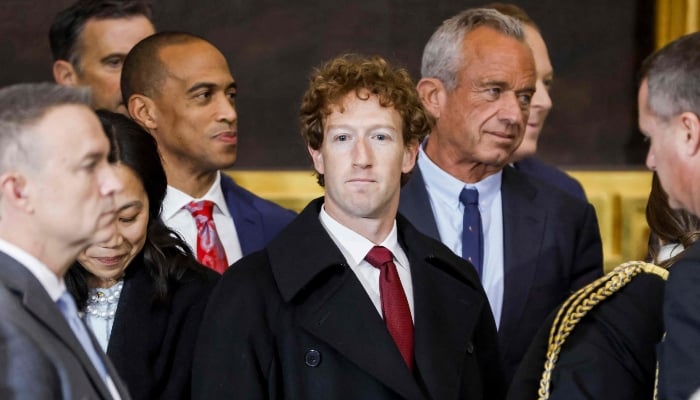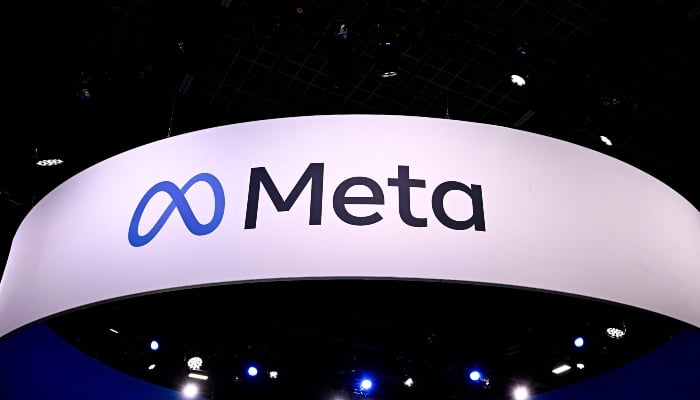US authorities set sights on Zuckerberg’s social media empire
Meta CEO will be taking the stand over a trial that will last at least eight weeks and kicks off on Monday
WASHINGTON: Tech giant Meta is set to stand trial next week, unless there is a last-minute reprieve, facing serious allegations from the US government that it exploited its market dominance by acquiring Instagram and WhatsApp to neutralise potential competition.
The trial, due to begin in a federal court in Washington, deals a blow to any hopes Meta CEO Mark Zuckerberg may have had that a potential return of Donald Trump to the White House would lead to a softening of antitrust enforcement against Big Tech.
The case is being brought by the Federal Trade Commission (FTC), the leading US consumer protection body, and could result in Meta being forced to divest Instagram and WhatsApp, two platforms that have become global giants under its ownership.
The case was originally made in December 2020, during the first Trump administration, and all eyes were on whether Trump would soften his stance against Big Tech during his second stint in the White House.
Zuckerberg, the world's third-richest person, has made repeated visits to the White House as he tries to persuade the US leader to choose settlement instead of fighting the trial, a decision that would be extraordinary at this late stage.
FTC Chair Andrew Ferguson downplayed such possibilities, telling The Verge: "I think that the President recognises that we've got to enforce the laws, so I'd be very surprised if anything like that ever happened."
Zuckerberg's lobbying efforts have included Trump inauguration fund contributions and overhauled content moderation policies favouring Republicans.
Even so, "I'm not sure Trump is persuaded that Zuckerberg is worthy of redemption," said George Hay, an antitrust law professor at Cornell Law School.
While a White House intervention remains technically possible, it would require both presidential and FTC agreement that the case lacks merit, he added.
The Meta lawsuit represents just one of five major tech antitrust actions initiated by the US government recently. Google was found guilty of search market dominance abuse last August, while Apple and Amazon also face cases.
Zuckerberg, his former lieutenant Sheryl Sandberg, and a long line of executives from rival companies will be taking the stand over a trial that will last at least eight weeks and kicks off on Monday.
'Really scary'
Central to the case is Facebook's 2012 billion-dollar purchase of Instagram — then a small but promising photo-sharing startup designed for mobile phones that now boasts two billion active users.
An email from Zuckerberg cited by the FTC reveals the concerns: "The potential impact of Instagram is really scary and why we might want to consider paying a lot of money for this."
The FTC argues Meta's $19-billion WhatsApp acquisition in 2014 followed the same pattern, with Zuckerberg fearing the messaging app could either transform into a social network or be purchased by a competitor.
Meta's defense will argue that substantial investments transformed these acquisitions into the blockbusters they are today, bearing little resemblance to their original versions.
They'll also highlight that the FTC initially approved both transactions and shouldn't be permitted a redo.
Recent court setbacks for the FTC — including failed challenges to Meta's Within acquisition and Microsoft's Activision Blizzard merger — may strengthen Big Tech's position.
Judge James Boasberg, who will decide and preside over the case, has already cautioned that the FTC "faces hard questions about whether its claims can hold up in the crucible of trial."
-
Annular solar eclipse 2026: Where and how to watch ‘ring of fire’
-
Scientists discover rare form of 'magnets' that might surprise you
-
Humans may have 33 senses, not 5: New study challenges long-held science
-
Northern Lights: Calm conditions persist amid low space weather activity
-
SpaceX pivots from Mars plans to prioritize 2027 Moon landing
-
Dutch seismologist hints at 'surprise’ quake in coming days
-
SpaceX cleared for NASA Crew-12 launch after Falcon 9 review
-
Is dark matter real? New theory proposes it could be gravity behaving strangely













